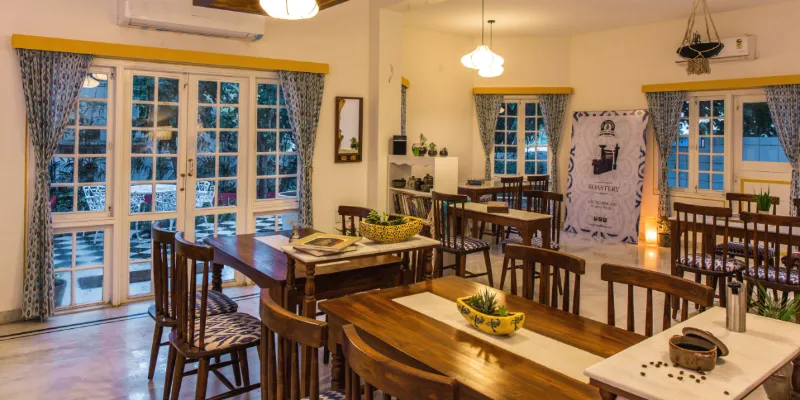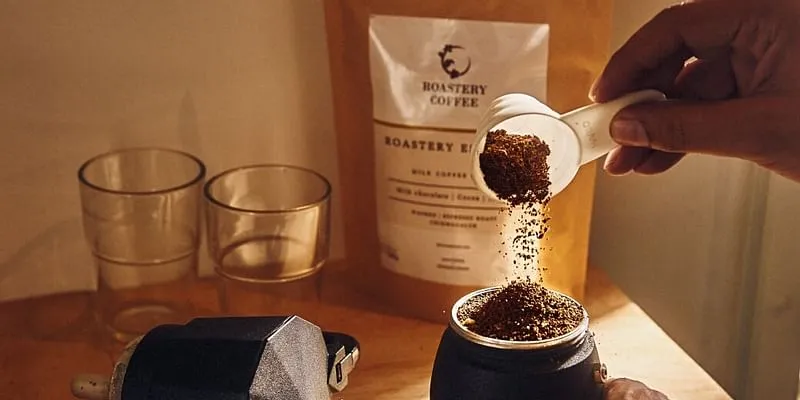Joining the coffee industry on his teacher’s advice, this 35-yr-old entrepreneur’s business now clocks Rs 8 Cr annually
Nishant Sinha’s teacher at IHM Jodhpur told him to join the coffee industry because Indians grow a lot of good quality coffee but don’t consume it as much. After working with CCD, HUL and Lavazza, he launched a cafe, Roastery Coffee House, in 2017.
According to research platform Statista, coffee is one of the most popular beverages in India, alongside tea. In 2018, the value of this market was estimated to be Rs 25 billion, according to a report by Coffee Business Intelligence.
For years, India has been indulging in instant and filter coffee, which is popular in south India. However, brewers and coffee experts believe that the country has just started to understand the taste and quality of freshly-brewed coffee, thanks to chains like Starbucks, Cafe Coffee Day (CCD), and most recently, .
Nishant Sinha, a graduate from the Institute of Hotel Management (Jodhpur), has worked in the coffee industry for several years. He also has a strong family background in the food and beverage industry. His grandfather was the chief catering inspector of Indian Railways, and Nishant’s father ran a catering business in Patna. This further gave him an impetus to seriously consider entrepreneurship.
Additionally, Nishant’s professor in college gave him two pieces of advice which played a significant role in shaping his journey. First, he suggested that he pursue a career in the quick-service restaurant (QSR) space as it had the potential to boom in the coming years, and second, he advised him to join the coffee industry.
“He said that we (Indians) grow a lot of good quality coffee but we don’t consume it as much,” Nishant adds. His teacher was right.
His first assignment was in CCD (Delhi), thereafter, he worked with Hindustan Unilever, Metro Cash and Carry, and Italy-based Lavazza.
Nishant also highlights that he learnt hospitality from CCD and “how to make customers feel at home”. He adds that his first roasting experience happened while working with Lavazza.
The year 2008 was a turning point for Nishant when he moved to Hyderabad for an assignment for Lavazza. Soon, he quit Lavazza and worked as a consultant, helping entrepreneurs set up cafes. This compelled him to marry his experience in the coffee industry with the growing cafe culture in India.
In 2017, Nishant opened Roastery Coffee House in Hyderabad’s Banjara Hills, with an initial investment of Rs 30 lakh. He bought a bungalow, the ground floor of which was converted into the cafe.
For some time, Nishant says he was living a very “chilled out” life. But with the cafe gaining acceptance, he found more avenues to grow and scale. Soon after, he opened another cafe in Kolkata and started supplying coffee beans to several places in and around Hyderabad, and even other places including Ahmedabad. The venture clocks sales worth approximately Rs 80 lakh every month and the company closed a turnover of Rs 8 crore in FY20.

Roastery Coffee House is present in Kolkata and Hyderabad
Brewing a good cup of coffee
All coffee beans for Roastery Coffee House comes from several coffee estates in India, specifically the ones in Chikmagalur. The coffee beans are roasted in-house using a Giesen coffee roasting machine which has been imported from Germany.
While delivering coffee online, Nishant says, his advice to the customers is to consume the coffee within 20 days of roasting it. Coffee is sold in different batches — varying from 1 kg to 250 grams — depending on the needs of the customers.
Roastery Coffee’s USP lies in its special category containing Cascara coffees. Cascara is the husk or dried skin of coffee cherries. These pulped skins are collected after the seeds have been removed from the cherries. They are then washed and dried in the sun for six days, cleaned, and then bagged. They are then shipped after resting for approximately two weeks.
The company offers two kinds of cascara coffees — Thogarihunkal Estate Cascara and Tat Tvam Organica Coffee Estate Cascara.
India is one of the largest exporters of coffee in the world, however, several studies reveal that India’s per capita consumption of coffee is very low.
Nishant explains, “There are various reasons for this. For instance, in southern India, coffee is very popular but in a different form. Making a filter coffee lover consume a freshly brewed coffee is very difficult.”
The other parts of the country, he says, are mostly tea-consuming. However, the trend is slowly catching up, thanks to the likes of Blue Tokai and KC Roasters.
While coffee remains central to the business, the company has diversified its menu to include salads, platters, and other snack and meal items. Nishant adds that 50 percent of the business comes from the food itself. Diversification has given him the opportunity and space to experiment in the coffee space.
Nishant also runs a separate entity — bean-to-bar chocolate brand, Colocal, with his spouse Sheetal Saxena.

From offline to online
The coronavirus pandemic did not spare Roastery Coffee House either. Nishant, who had majorly been operating through the offline space, was compelled to go online in the wake of COVID-19.
He says, “People would often ask us to ship coffee or sell it online. But our whole business model was focused on giving people a good cup of coffee in a cafe-like experience. But the pandemic changed everything.”
The cafe was shut for a few months owing to the lockdown. Nishant used this time to launch its website and get listed on marketplaces such as Amazon and 16 Gram Coffee.
He also created a lot of content to enhance his website and connect with the customers. He says, “The cafe was closed but the demand was there. Everybody had a lot of time in their hands so they wanted their coffee, even if it meant brewing it at home.”
Nishant says he conducted several workshops while working on the online model. He says that he faced a lot of struggle to deliver the coffee on time. There was even a point when floods in Hyderabad halted the delivery services for a few days.
What lies ahead?
Nishant predicts the Indian coffee industry will undergo a change in the coming times. “It is high time that people should move away from the mindset of treating coffee as a thing to give you some kick. We should start enjoying it the way it is,” he reflects.
He adds that the cafe culture is not going anywhere and it is only a matter of time before the cafe business bounces back.
“Work from home culture is benefitting a lot of MNCs, hence, online sales are going to increase,” Nishant says.
Apart from working on and enhancing the online model, Nishant wants to establish a Roastery Coffee House cafe in every metropolitan city in India. “We don’t want multiple outlets in one city. Our approach is more like one cafe in one city,” he illustrates.
Edited by Kanishk Singh










